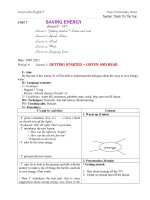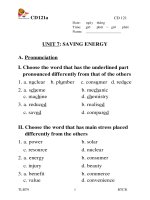Unit 7: Saving energy
Bạn đang xem bản rút gọn của tài liệu. Xem và tải ngay bản đầy đủ của tài liệu tại đây (4.84 MB, 21 trang )
Nuclear Power
Solar power Oil power Water power
Windy power Tide power
Check-up
Check-up
What did you do to save electricity at home?
What did you do to save electricity at home?
- Turn off the electrical appliances if they are
- Turn off the electrical appliances if they are
unnescessary.
unnescessary.
- Use saving-energy electrical appliances.
- Use saving-energy electrical appliances.
7570 100 700 70.000
7550 80
56.000700
ordinary 100-watt light bulb
ordinary 100-watt light bulb
energy-saving bulb
last eight times longer
last eight times longer
Unit 7: saving energy.
Unit 7: saving energy.
Leson 3:
Leson 3:
read
read
read
read
In Western countries, electricity, gas, and water are not luxuries
but necessities.Companies now realize that consumers want
products that will not only work effectively, but also save money.
For most North American households, lighting accounts for 10
percent to 15 percent of the electricity bill. However, this amount
can be reduced by replacing an ordinary 100-watt light bulb with an
energy-saving bulb. These bulbs use a quarter of the electricity of
standard bulbs and last eight times longer. Therefore consumers can
save about US$7 to US$21 per bulb.
In Europe, there is a labeling scheme for refrigerators, freezers,
washing machines and tumble dryers. The label tells the consumers
how much energy efficiency each model has, compared with other
appliances in the same category.
Ultimately, these innovations will save money as well as
conserve the Earth’s resources.
Vocabulary
Vocabulary
-
Luxury (n) > < Necessity (n)
Luxury (n) > < Necessity (n)
-
Consumer (n)
Consumer (n)
User products or services
User products or services
-
Labeling scheme (n-phr)
Labeling scheme (n-phr)
Campaign that gives
Campaign that gives
labels to
labels to
products.
products.
-
Innovation (n)
Innovation (n)
New ideas, methods, or new
New ideas, methods, or new
changes that are better than old ones.
changes that are better than old ones.
-
Category (n)
Category (n)
Products that have the same size,
Products that have the same size,
function
function
-
Ultimately
Ultimately
(adv) for a long time
(adv) for a long time
L
C
La
T
I
Ca
U
- Tumble dryer (n-phr)
- Tumble dryer (n-phr)
read
read
In Western countries, electricity, gas, and water are not luxuries
In Western countries, electricity, gas, and water are not luxuries
but necessities.Companies now realize that consumers want
but necessities.Companies now realize that consumers want
products that will not only work effectively, but also save money.
products that will not only work effectively, but also save money.
For most North American households, lighting accounts for 10
For most North American households, lighting accounts for 10
percent to 15 percent of the electricity bill. However, this amount
percent to 15 percent of the electricity bill. However, this amount
can be reduced by replacing an ordinary 100-watt light bulb with an
can be reduced by replacing an ordinary 100-watt light bulb with an
energy-saving bulb. These bulbs use a quarter of the electricity of
energy-saving bulb. These bulbs use a quarter of the electricity of
standard bulbs and last eight times longer. Therefore consumers can
standard bulbs and last eight times longer. Therefore consumers can
save about US$7 to US$21 per bulb.
save about US$7 to US$21 per bulb.
In Europe, there is a labeling scheme for refrigerators, freezers,
In Europe, there is a labeling scheme for refrigerators, freezers,
washing machines and tumble dryers. The label tells the consumers
washing machines and tumble dryers. The label tells the consumers
how much energy efficiency each model has, compared with other
how much energy efficiency each model has, compared with other
appliances in the same category.
appliances in the same category.
Ultimately, these innovations will save money as well as
Ultimately, these innovations will save money as well as
conserve the Earth’s resources.
conserve the Earth’s resources.









